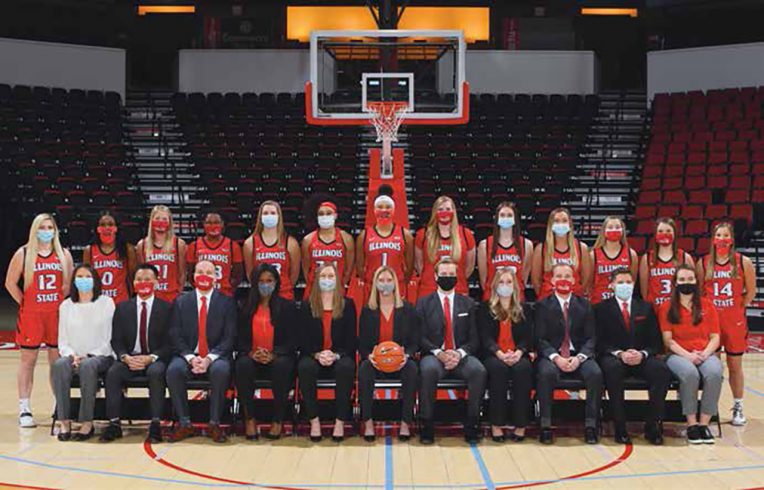As the phone rang inside the Illinois State women’s basketball offices in the early afternoon of December 9, Director of Operations Katie Bolkema, M.S. ’16, braced for a call she had both sent and received plenty of times throughout the early part of the makeshift college hoops season.
Sure enough. On the other end of the line was an assistant coach from a school the Redbirds were supposed to play in just 11 days. A positive COVID-19 test had shut down that program for a mandatory isolation period. It would have to cancel its trip to Redbird Arena.
Appears InBolkema hung up, drew yet another red ‘x’ on the scheduling board, reached out to the business and accounting offices to terminate the contract, and began work finding a new opponent.
It was the fourth official game scrapped. Countless other opportunities, such as hosting a top-ranked team, were axed before they were ever made official. The Redbirds had just one game under their belt, an unprecedented number for mid-December. Nonconference opponents are usually scheduled for certain reasons—whether it be a relationship with the school’s coaching staff, a home-and-home contract, or similar style of play to a conference team.
The goalposts moved for the 2020-2021 season.
“If they are in the Midwest and can dribble a basketball, we will play them. That’s where we are at,” Bolkema said on December 10. “We want to just be running up and down the court.”
That has been reality for college athletic programs across the country, scrambling to form some kind of a season while keeping public safety protocols at the forefront of every decision.
At ISU, men’s and women’s basketball were the first athletic programs to begin competition since the March hiatus. It was a constant challenge for everyone involved, including those making things happen behind the scenes.
While scheduling opponents was its own battle, step one was to make sure Redbirds were available to play. That meant a rigorous COVID-19 checklist headed up by Assistant Athletic Director of Medical Services John Munn.
The Missouri Valley Conference issued KINEXON SafeTags—a lightweight, wearable device that performs quick and accurate contact tracing. Training staff monitored who was in close proximity of who, should an outbreak have occurred.
The women’s team utilized that feature early in the season. After a positive test on the Redbirds roster, the SafeTags showed who was within 6-feet of the effected person. Those individuals had to quarantine, and the Redbirds were forced to cancel their first three games of the season. The team wasn’t able to work out together for an extended period of time.
“We had four players not in quarantine. We were going through skill work, plays, and anything we could do to keep fitness levels up,” Bolkema said.
Even after getting the all-clear to play, itineraries changed fast. On December 3, men’s basketball finalized a game at Murray State for two nights later. The Racers are five hours away in Murray, Kentucky, which fit the Redbirds’ travel zone for the 2020-2021 season. The team avoided flying, and six hours was the unofficial limit for how far they could bus.
Spencer Johnson, director of operations on the men’s team, had less than 48 hours to reserve transportation, lodging, and dining options for the players and personnel. Lo-and-behold, the Redbirds were well rested, fed, and on the court for tip-off that night.
“It can change at the bat of an eye,” Johnson said. “I just cooperated with all my communications sources and with bus companies and hotels. They are already aware of the circumstances, so they aren’t blindsided by it. They have been extremely accommodating.”
Johnson and Bolkema arranged seating charts on buses and pairings for hotel rooms. Johnson said they usually paired players who have contracted the virus with players who hadn’t yet, allowing for that small window of immunity immediately after recovery to run its course.

Normally the Redbirds would eat a catered meal at a hotel or go to a restaurant for a pregame meal. During the 2020-2021 season, teams had specific meals boxed at the hotel or catered in from a local restaurant if the hotel paused its dining services. Players ate in their rooms properly spaced from others.
Traveling members got to know the insides of their hotel rooms well. For extended stays—such as the men’s team’s five-day, two-game trip to Columbus, Ohio, over Thanksgiving weekend—the teams were limited on what they could do off the court. Trips to a movie theatre or restaurant are strong bonding opportunities. This year, those were limited.
The unfamiliarity of the situation carried over to the court too. Typically, teams spend practices leading up to games scouting opponents and figuring out a game plan. With last-minute schedule changes, teams sometimes took the court without knowing much about their opponent. Coaches instead focused heavily on internal improvements, hoping the rest would take care of itself.
“You try and focus on yourself and your concepts and try not to stress about every little detail because it’s such a short turnaround,” men’s basketball assistant coach Brian Jones said.
People within the programs could only exhale when the ball was tipped, making every game feel special. At Illinois State, it was a team effort through and through to provide student-athletes the opportunity to play.
“There’s no handbook on how to handle a pandemic,” Bolkema said. “I think we are very fortunate with the support that we have had here.”

